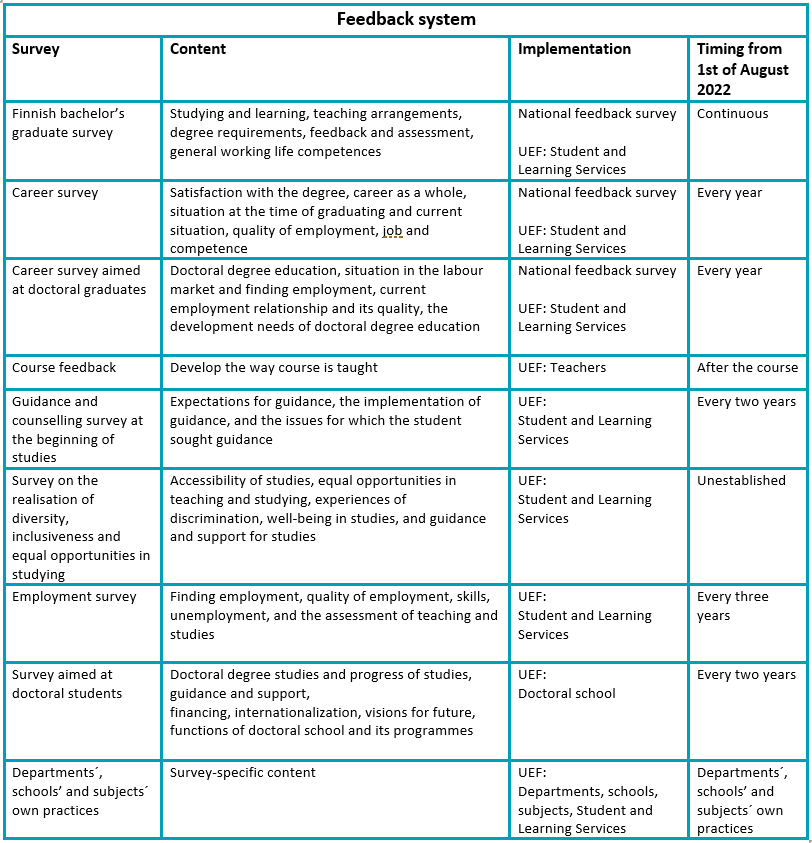As mentioned in the SAR, UEF collects feedback data at different levels by using different methods. There are, for example, feedback days in the departments during the student union’s Smile and Complain Week. Students can give anonymous feedback to the student union, the university, the health service, the caterer, or any other party that has an impact on student life. Student feedback is analysed at different levels of management, e.g., the Teaching and Advising Council, the Faculty Course Development Committee, the academic subject, or the department. Students are involved in the decision-making bodies, which gives them the opportunity to make their voices heard. They are also involved in feedback system processes and designing feedback systems. This is confirmed in the audit interviews by the students, the teaching staff, and the deans. The deans in particular underline the assumption that there is good progress in developing a coherent quality management system regarding student feedback.
Students reported that feedback was widely collected, but experiences varied in whether they reported that their feedback was listened to. Students’ experiences with feedback are predominantly positive: students stated that feedback was welcome, and that there were multiple mechanisms to provide feedback. Students sometimes saw the results of their feedback in changes to programs or courses. However, some students have the feeling that feedback was systematically ignored or clearly undesired by certain faculty members. Student representatives also mentioned that in some cases UEF is not interested in comprehensive feedback.
Feedback on feedback to students (i.e., information about changes introduced because of student feedback) is not provided regularly. As a student noted during the audit visit, this is only offered in some degree programmes. However, interviews revealed that university management is aware of this problem and working on it. Another challenge is to encourage students to give feedback. Feedback fatigue is often reported in the audit visit, but this may be due to a lack of regular feedback on feedback in the sense that those giving feedback do not recognise the value of their feedback. Feedback fatigue can also be a sign that feedback requests should be targeted and clearly valuable. Against this background the audit team views student feedback – collecting, accepting, and responding to it – as an area of development for UEF. The audit team recommends a critical evaluation of feedback strategies and procedures and the introduction of more systematic feedback on feedback.
As stated in the SAR, the university regularly monitors and evaluates the degree programmes and other education provision. Various measures are used, like employment analyses and surveys, but as some university representatives explained, it is difficult to do this in a coherent way. This also applies to the evaluation of links to working life. This is easier for programmes with a vocational focus than for more general programmes. Learning success in terms of employment is monitored, but there is room for improvement. The audit team recommends that UEF should monitor learning outcomes and processes more systematically. A learning analytics system to analyse and support individual student learning is being discussed at the university but is not yet in place. Regarding the goal of implementing individual learning paths, the control of individual learning processes as well as the assessment of individual learning success is important.
As mentioned during the audit visit, UEF follows the approach of combining the competences of the staff with the strategic objectives of the institution. For example, UEF has combined career guidance with the help of professors from the Philosophical Faculty. The university services have their own surveys such as regular surveys on well-being. New staff and administrative personnel were recruited to address this issue. This is a good example of how staff feedback leads to change.
